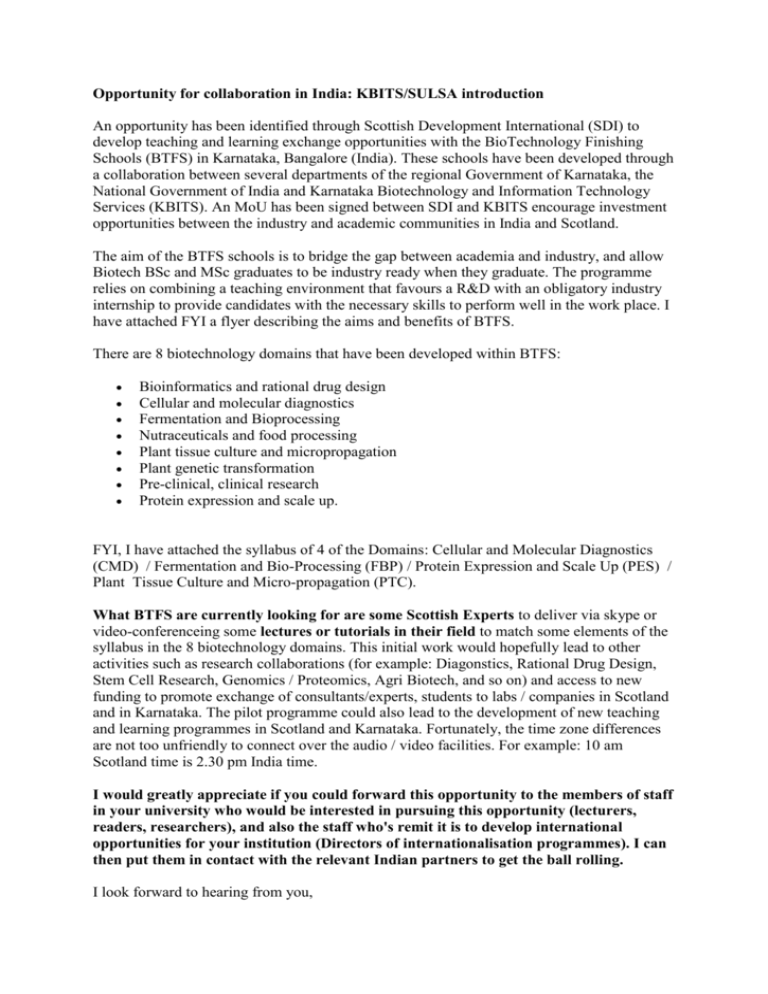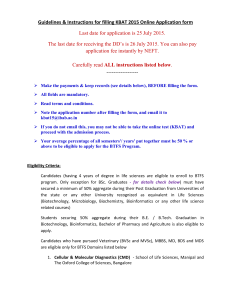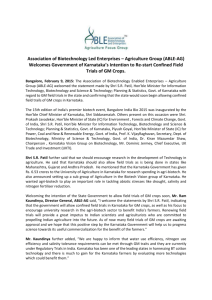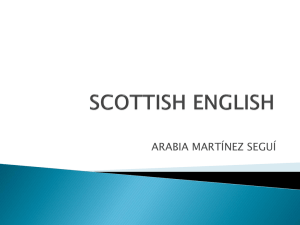Opportunity for collaboration in India: KBITS/SULSA introduction An
advertisement

Opportunity for collaboration in India: KBITS/SULSA introduction An opportunity has been identified through Scottish Development International (SDI) to develop teaching and learning exchange opportunities with the BioTechnology Finishing Schools (BTFS) in Karnataka, Bangalore (India). These schools have been developed through a collaboration between several departments of the regional Government of Karnataka, the National Government of India and Karnataka Biotechnology and Information Technology Services (KBITS). An MoU has been signed between SDI and KBITS encourage investment opportunities between the industry and academic communities in India and Scotland. The aim of the BTFS schools is to bridge the gap between academia and industry, and allow Biotech BSc and MSc graduates to be industry ready when they graduate. The programme relies on combining a teaching environment that favours a R&D with an obligatory industry internship to provide candidates with the necessary skills to perform well in the work place. I have attached FYI a flyer describing the aims and benefits of BTFS. There are 8 biotechnology domains that have been developed within BTFS: Bioinformatics and rational drug design Cellular and molecular diagnostics Fermentation and Bioprocessing Nutraceuticals and food processing Plant tissue culture and micropropagation Plant genetic transformation Pre-clinical, clinical research Protein expression and scale up. FYI, I have attached the syllabus of 4 of the Domains: Cellular and Molecular Diagnostics (CMD) / Fermentation and Bio-Processing (FBP) / Protein Expression and Scale Up (PES) / Plant Tissue Culture and Micro-propagation (PTC). What BTFS are currently looking for are some Scottish Experts to deliver via skype or video-conferenceing some lectures or tutorials in their field to match some elements of the syllabus in the 8 biotechnology domains. This initial work would hopefully lead to other activities such as research collaborations (for example: Diagonstics, Rational Drug Design, Stem Cell Research, Genomics / Proteomics, Agri Biotech, and so on) and access to new funding to promote exchange of consultants/experts, students to labs / companies in Scotland and in Karnataka. The pilot programme could also lead to the development of new teaching and learning programmes in Scotland and Karnataka. Fortunately, the time zone differences are not too unfriendly to connect over the audio / video facilities. For example: 10 am Scotland time is 2.30 pm India time. I would greatly appreciate if you could forward this opportunity to the members of staff in your university who would be interested in pursuing this opportunity (lecturers, readers, researchers), and also the staff who's remit it is to develop international opportunities for your institution (Directors of internationalisation programmes). I can then put them in contact with the relevant Indian partners to get the ball rolling. I look forward to hearing from you, Kind regards, Den _______________________________ Dr Denise Barrault Executive Director Scottish Universities Life Sciences Alliance - SULSA Room 308 Darwin Building Kings Buildings Edinburgh EH9 3JR map: http://bit.ly/hDCygz Tel: +44 (0)131 651 9061 Mob: 07971 683 410 email: denise.barrault@ed.ac.uk www.sulsa.ac.uk Follow us on Twitter: http://twitter.com/@SULSAtweets











![[1] , ramegowda.rb [2] , phani konide](http://s3.studylib.net/store/data/007232622_1-484c205d524e137367bdbb76b981f60c-300x300.png)